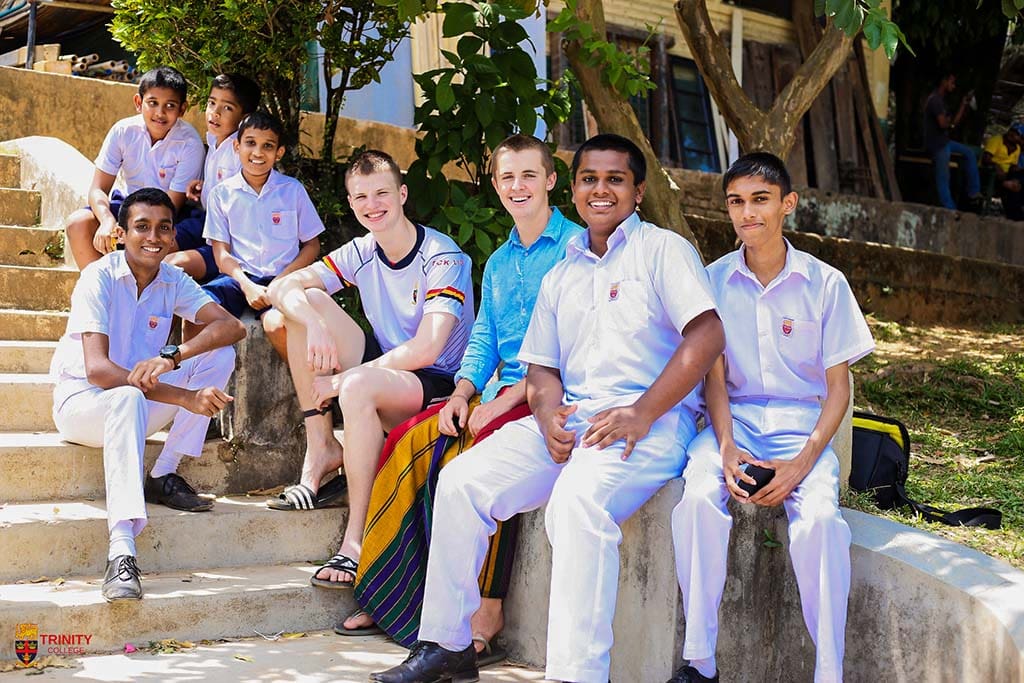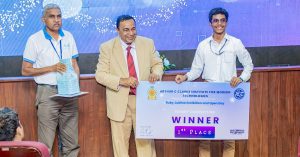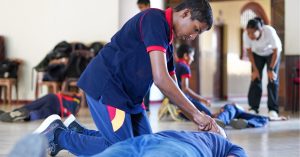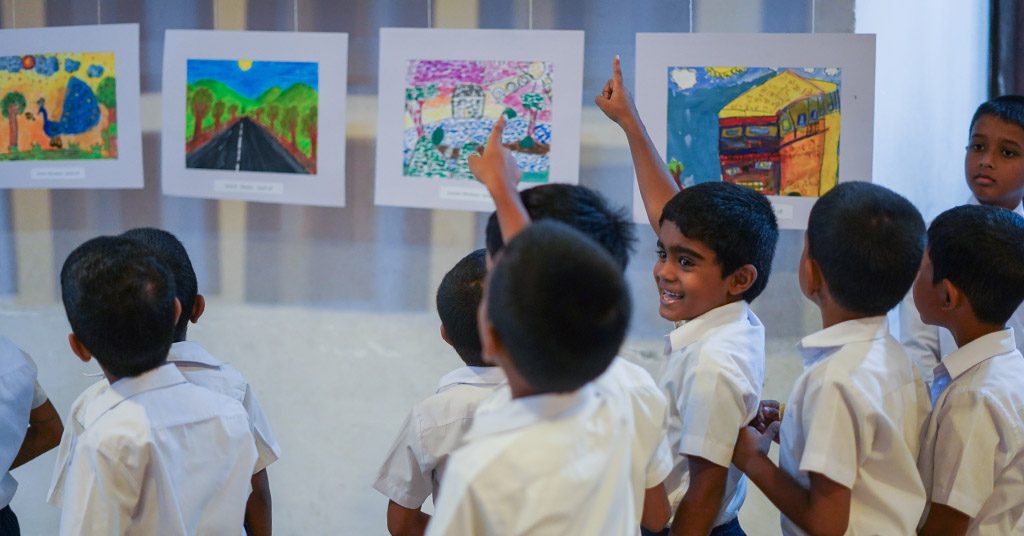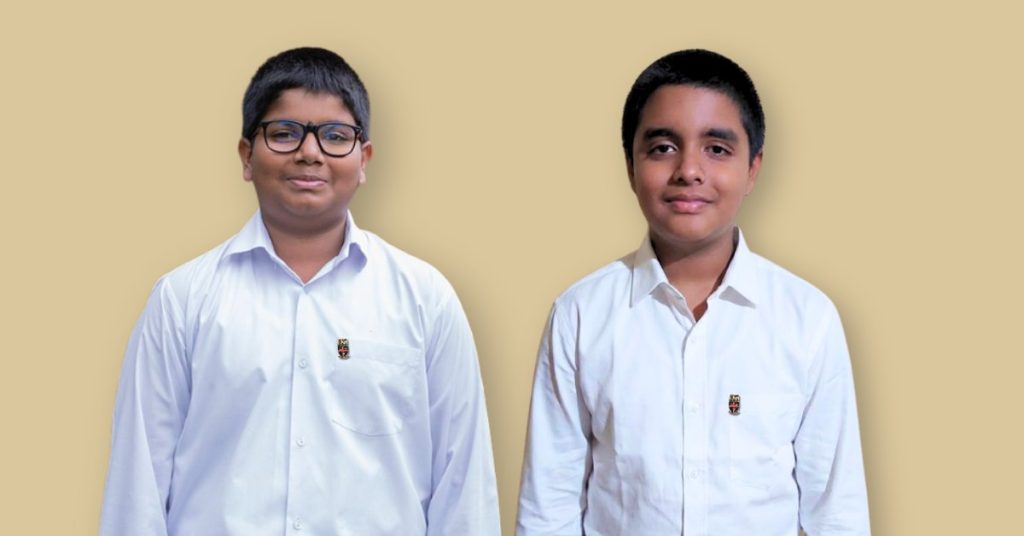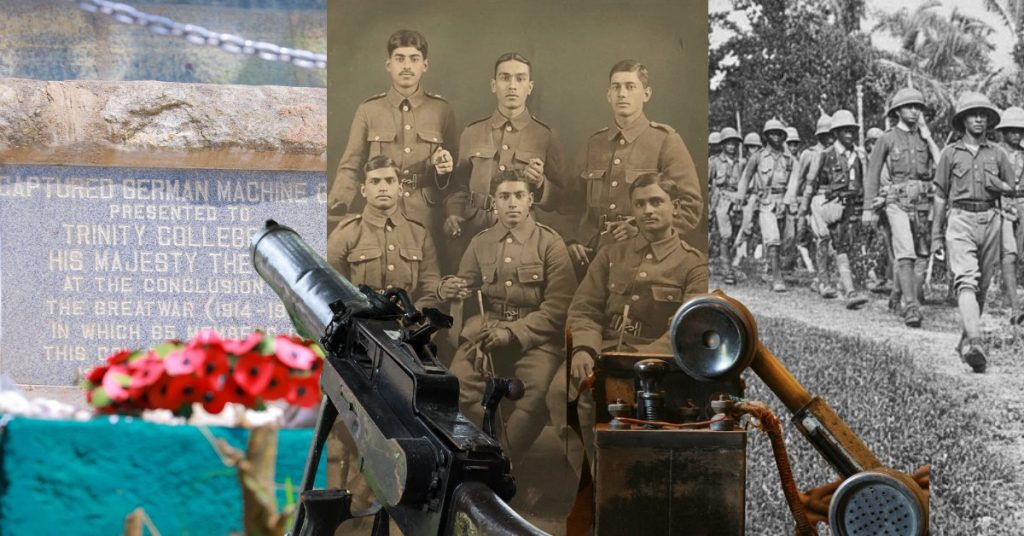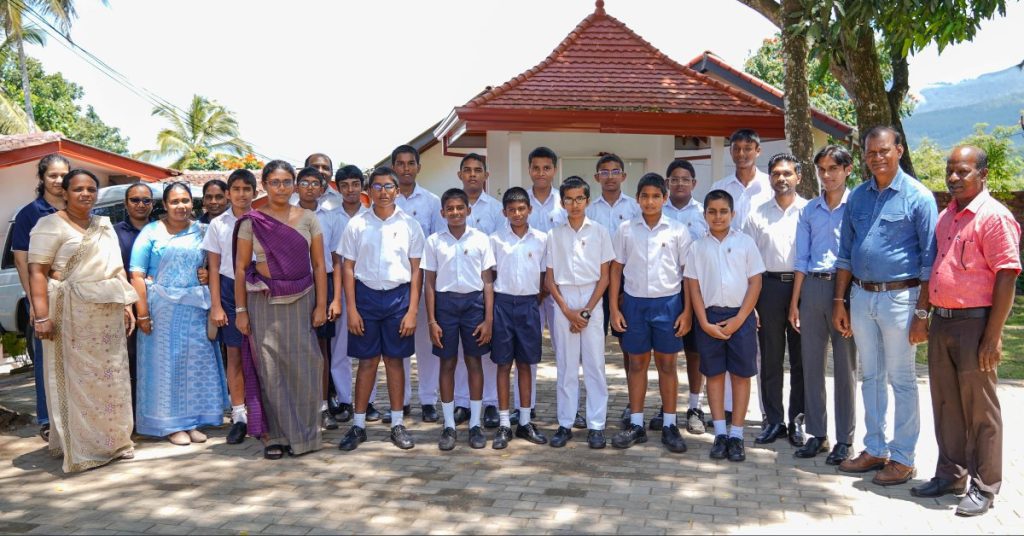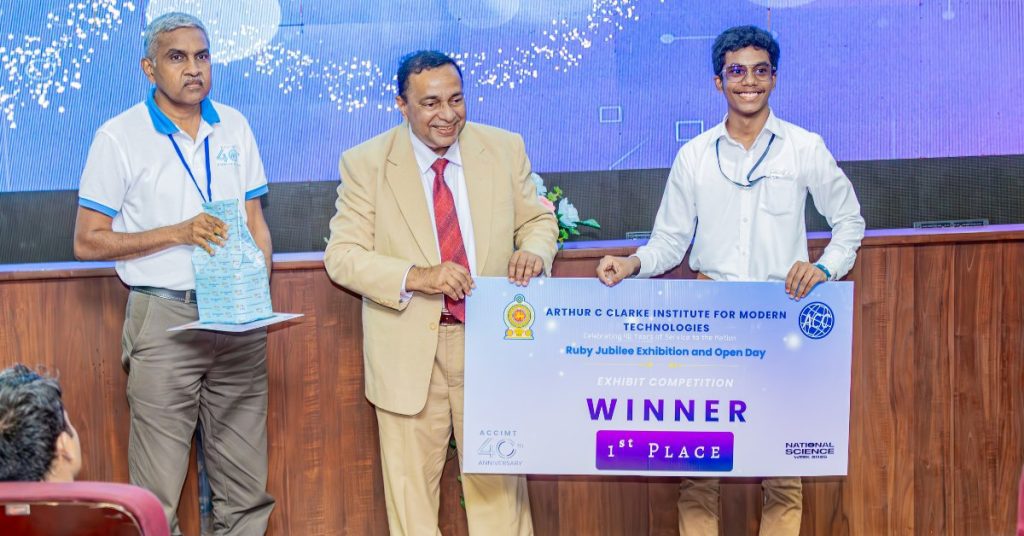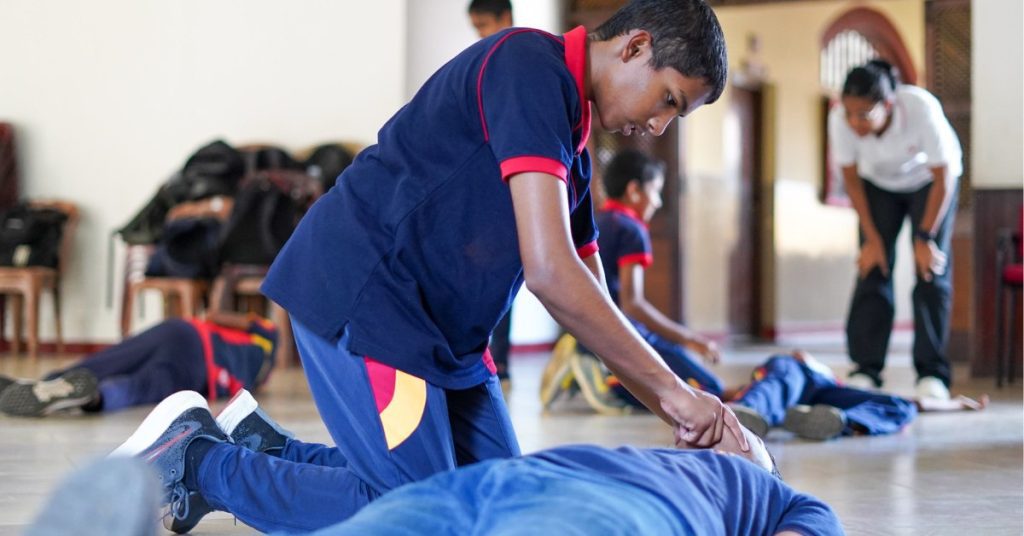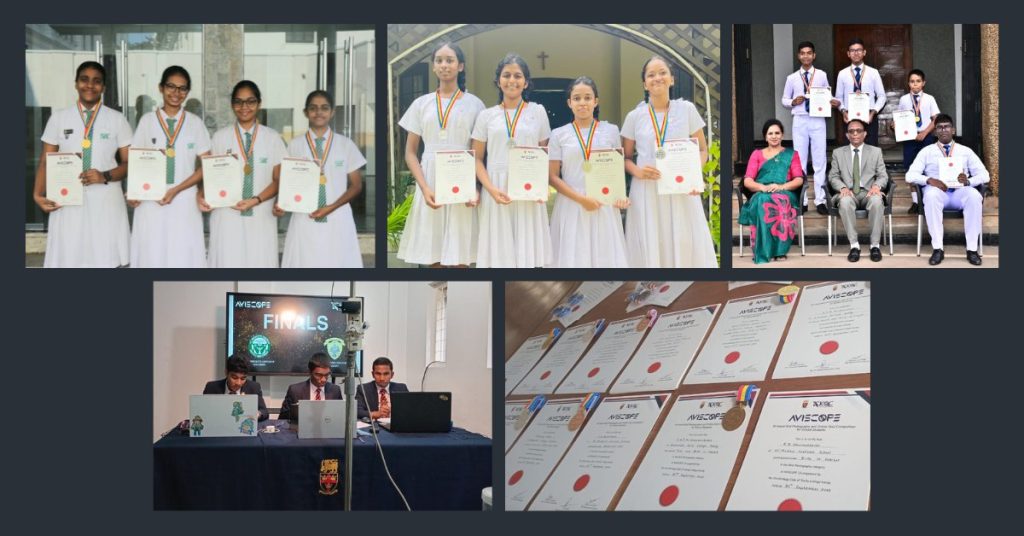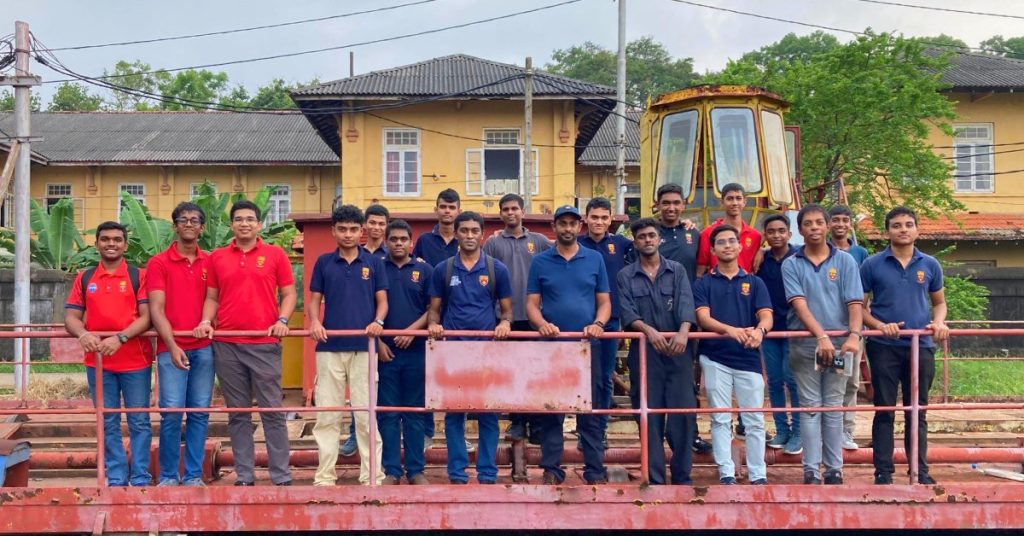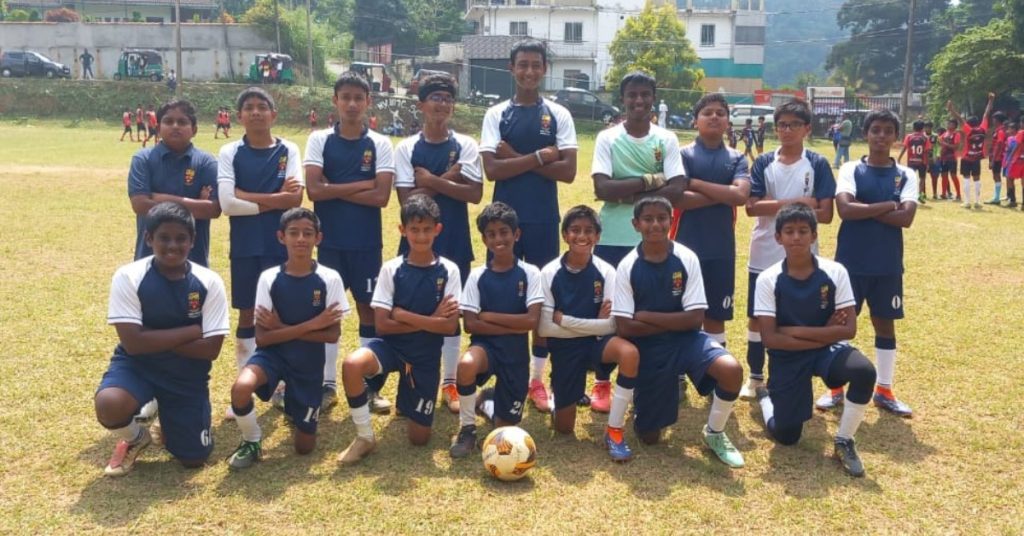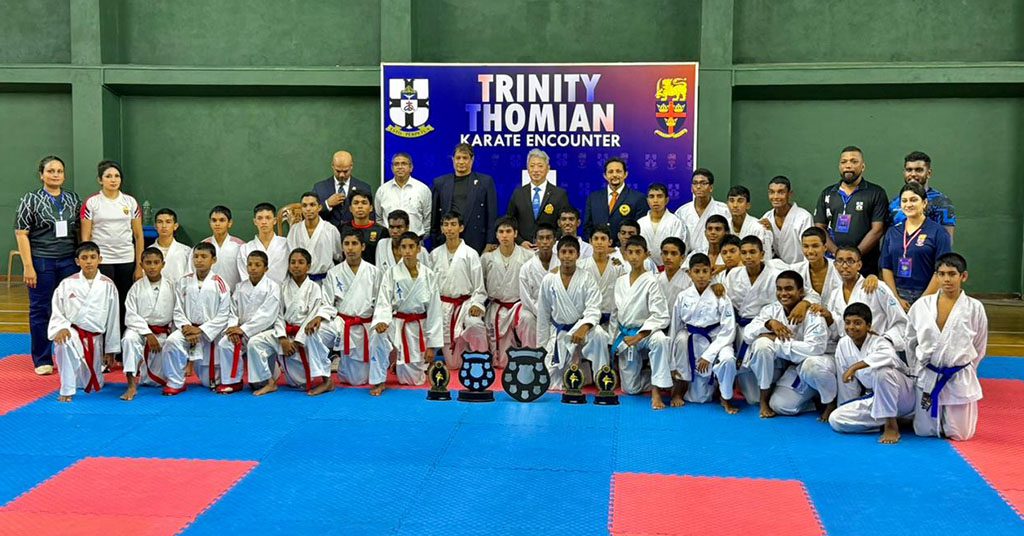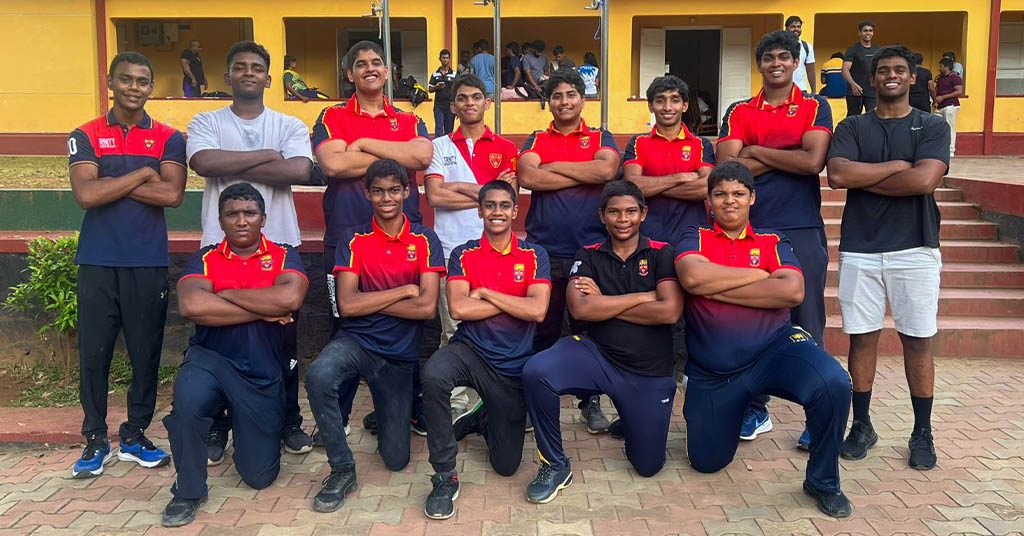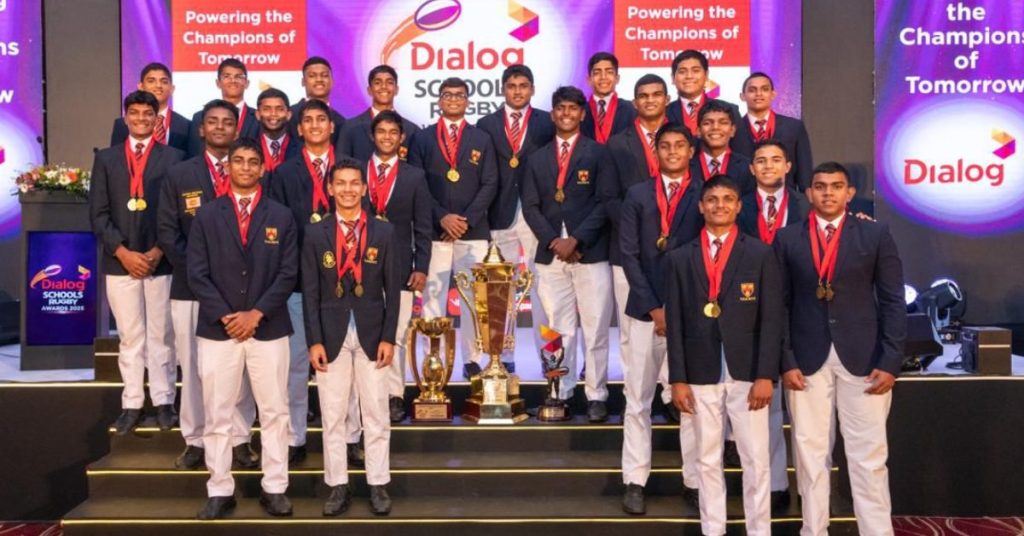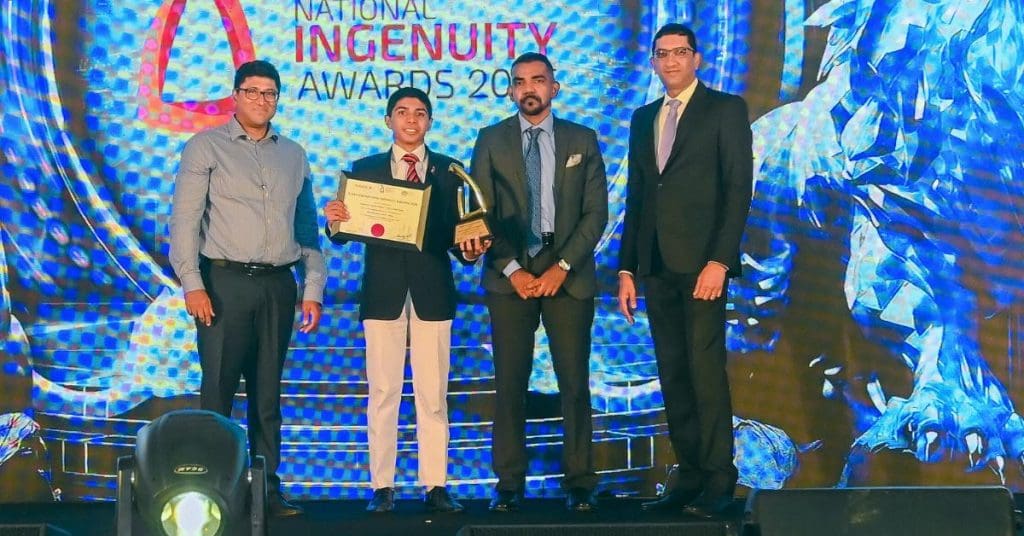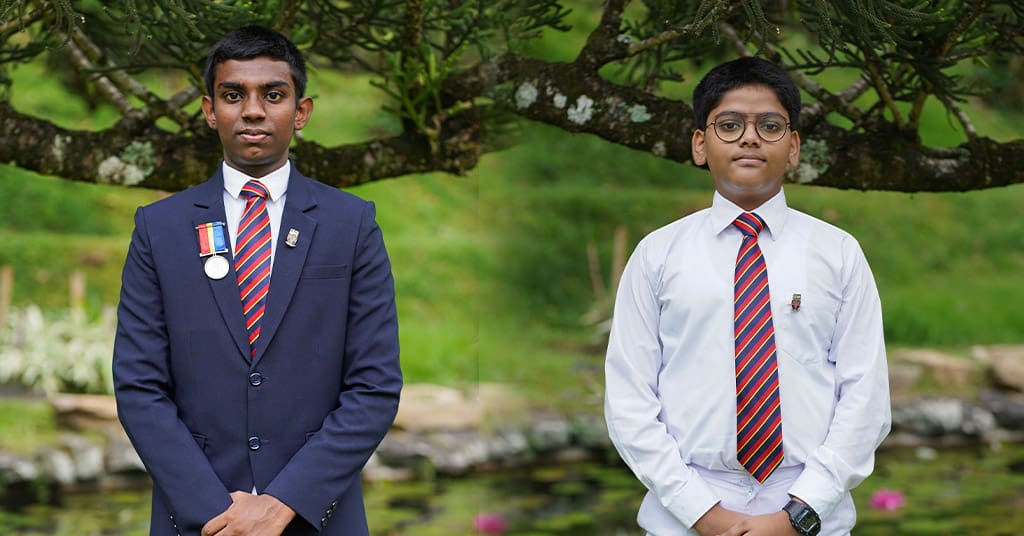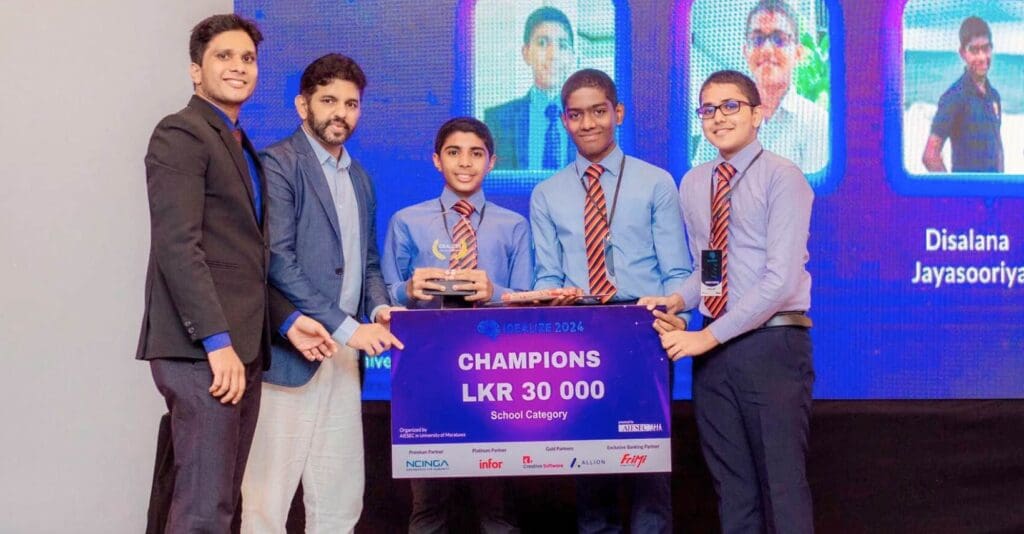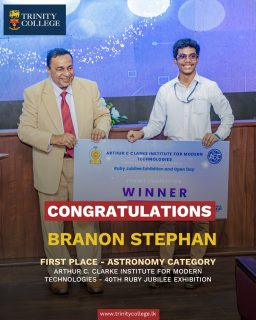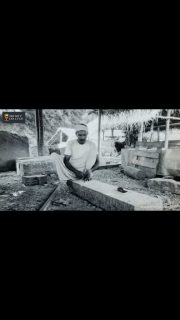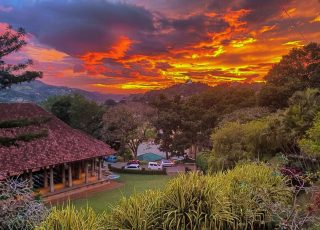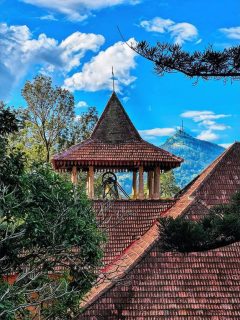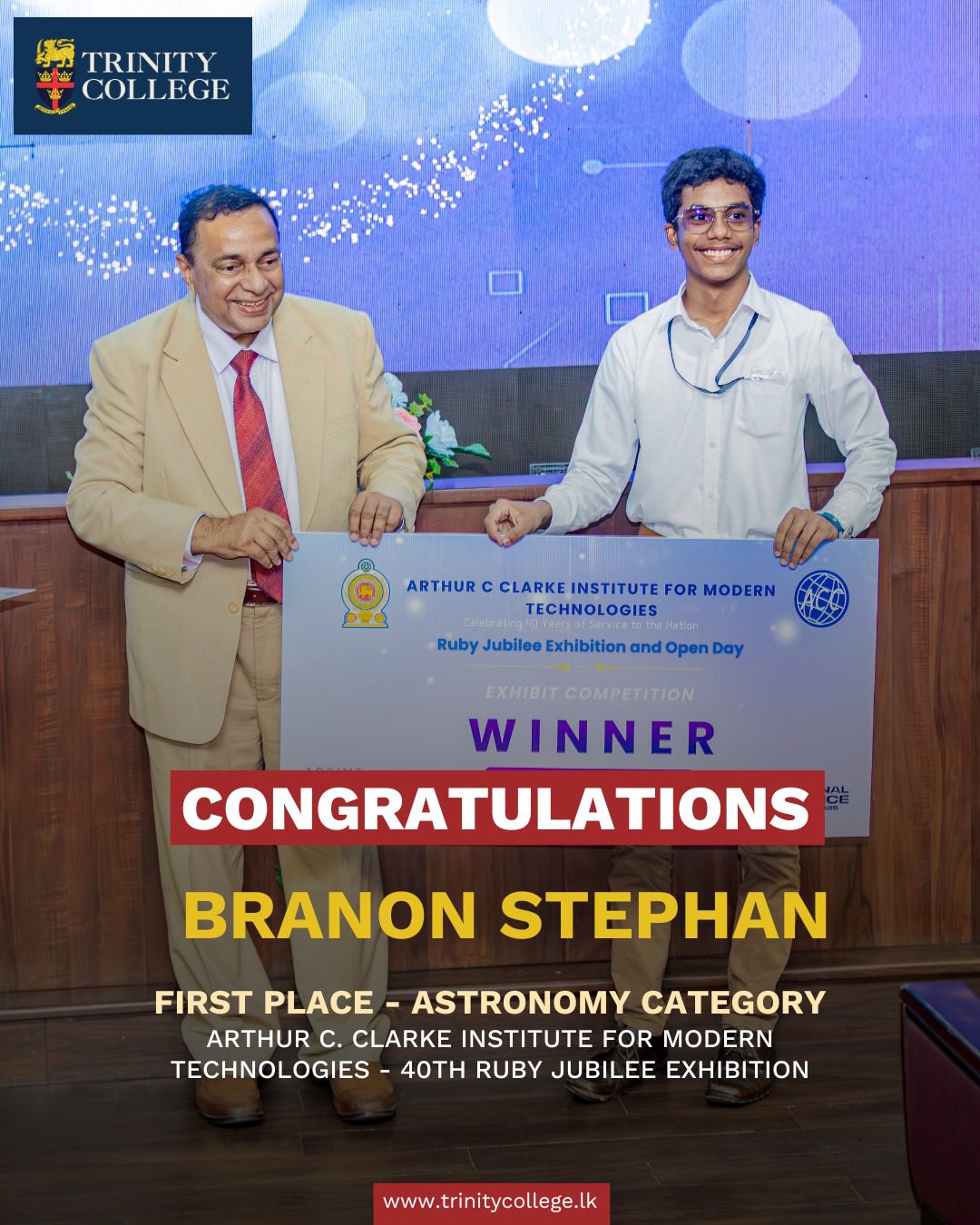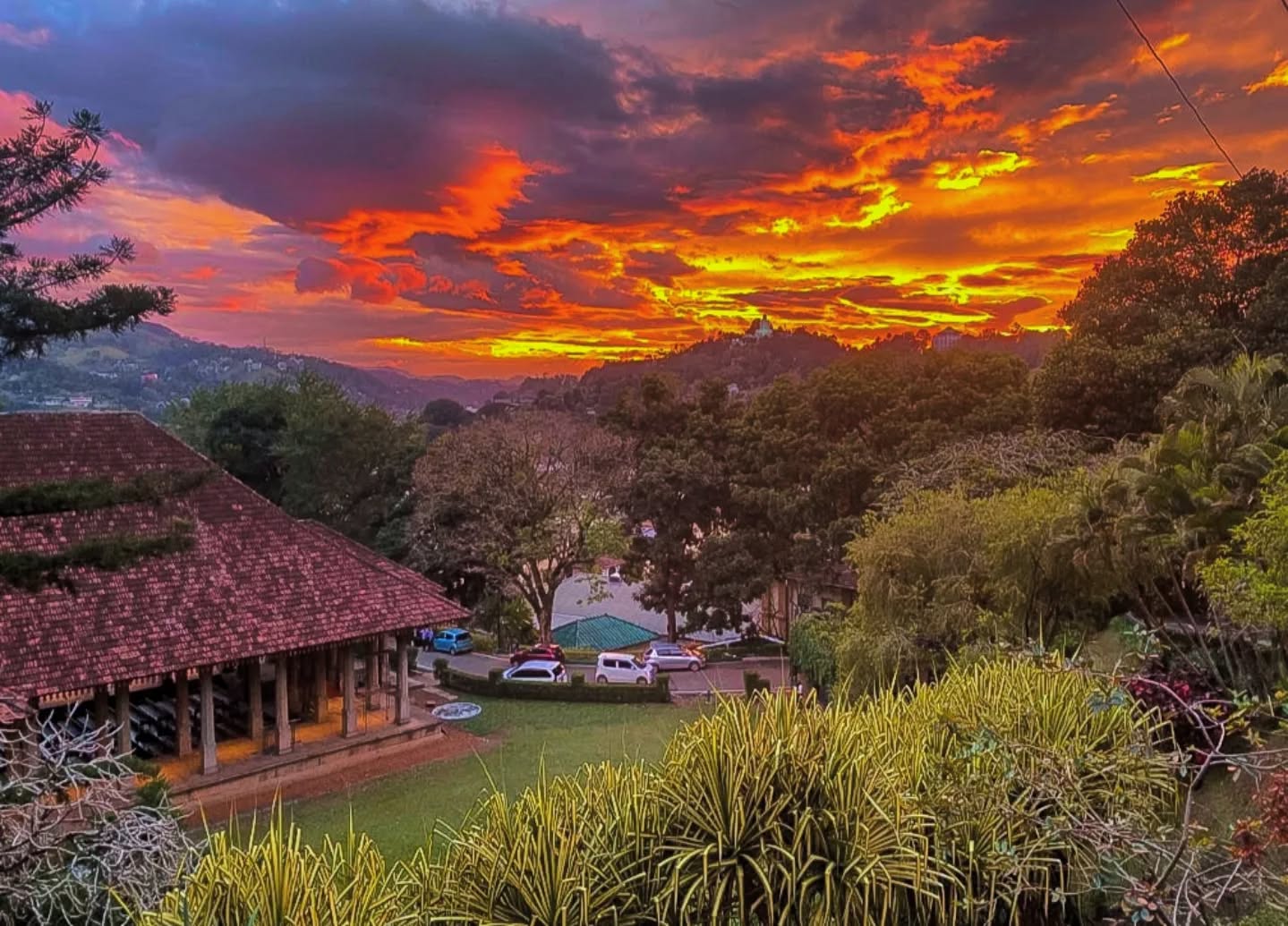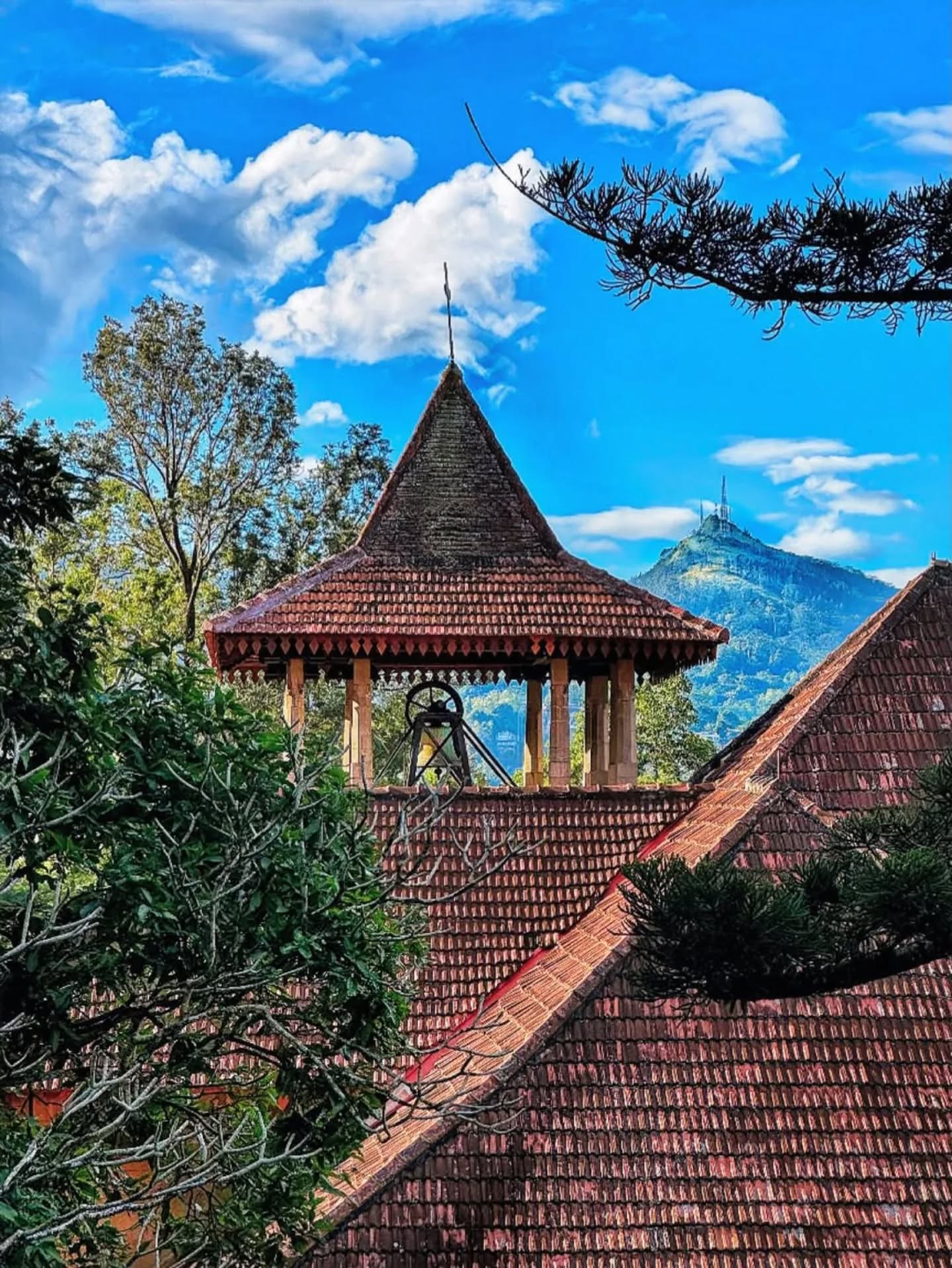At Trinity it’s definitely not strange to see gap year teaching assistants from abroad helping out and taking part in all sorts of events at school, you could say that it is almost a tradition.
The newest members joining the Trinity family are Arthur and Patrick, who will be following courses in Languages an Economic Geography, respectively, at university when they return.
They have mostly been in the Junior and Middle school, and the rest of the College might not have met them.
Therefore, we at the Web Content Team had the idea of interviewing them and to find out what they think about the College and their experiences living in Sri Lanka, however, we never expected to hear about the huge impact the College and our motherland had on their hearts.
When did you come to Sri Lanka?
Arthur: I came on the 8th of January, and I’ve been here for 3 months now, that’s one term.
Patrick: I came later, in the beginning of March, it’ s just my fifth week now, it was a lot of help that Arthur’s been here a long time so I’d got used to it lot quicker.
Is this your first time in Sri Lanka?
Arthur: No, both of us had already come here before on a cricket tour. We came to Kandy and we played at the Pallekale stadium. We didn’t play with Trinity College, but we did give a good performance, I had one of my best cricketing experiences at Pallekale.
Patrick: We both like our cricket.
Arthur: Both of us really enjoyed it, so we thought we’d come back and play sooner or later.
Where are you from in England?
Patrick: We’re both in west London, I’m near Twickenham, near the rugby stadium and he’s a bit more north of me.
Did you both attend the same school?
Patrick: We’ve been in the same school for five years.
Arthur: It’s a day school in Barnes, London with slight rivalry with Eton College.
Patrick: We never really liked Eton that much!
What was your first impression of Trinity?
Arthur: I came here not knowing what to expect, I hadn’t heard of Trinity that much. My first impression was that it was a prestigious school and a lot of people around Kandy had a lot of respect for Trinity. When they heard that I was working at Trinity, they were very impressed as they knew what Trinity was like.
And, also a lot of the kids were very disciplined, very polite and all that, so it was definitely a good first impression.
Patrick: I obviously asked him before I came out. I asked him a lot of questions about the school, so I kind of had a feel for what it would be like.
When I arrived everyone was very welcoming and very nice to me and was like “Am I the other English guy?”, and also the school students were very proud of my being here.
What did you think of the boys at Trinity?
Arthur: At first, they were very polite to me, you know like “Good morning sir”, and then as they got to me, they became more and more familiar.
Patrick: And, they get cheeky over time, the younger ones especially!
Arthur: So, before they were like “Good morning sir”, very serious, and then weeks later they were giggling, pointing, laughing, pranking you and stuff.
So, I say polite to start with, but when you get to know them, they’re much more cheeky, much more fun to be around.
How would you rate them on a scale of 1-10?
Arthur: I couldn’t give them a 10 because some of them were very annoying!
Patrick: You know, as a class they’re good and easy to control, and then you get other classes full of “devils”!
Arthur: But, they’re obviously never nasty, always meaning well. It’s the same in England.
Is it similar to your school?
Patrick: Our school although it is a prestigious school in England, it didn’t have traditions as much as here and it doesn’t have a strict routine as much, but here it’s different, and it’s interesting to see.
In our school we have traditions to do each week, and also it’s really different with the big games. We had big games but it wasn’t like the whole school knows about it or all get involved. I came out a week before the big games, rugby and cricket and it’s just very passionate.
Arthur: I definitely think in Trinity there’s much more, not patriotic feelings, it’s much more sort of loyalty, much more. So, it feels like Trinity is like a big group of people together.
In our school it’s definitely the same, but Trinity is another level. Like when all you guys turn up and watch a whole day’s cricket and then turn up for the second day as well, like you’re giving up so much time to support your fellow Trinitians, we never get that kind of support at home. Both of us were in the first 11 (Rugby) at our school, we never got a crowd.
What do you think of the curriculum and the extra curricular activities?
Arthur: The curriculum from what I’ve seen, a lot of it’s taught by a text book, so it’s quite similar to that in England. I haven’t taught much cricket myself, I’ve been doing General English classes.
Patrick: In the middle school you get these text books and you try follow that, but maybe at times it’s easy and at others it could be extended more. I always try to bring up new stuff I knew and they could maybe learn from it.
Arthur: One thing you could definitely tell is the abilities in each class are very different. You get some people who really excel in one area and some people sort of struggle and need more time.
So, when you’re teaching the curriculum you have to obviously teach what you know, but also try and push the people who are finding it a bit easy and at the same time wait for others who need a bit more time – it’s important to adapt. Even though you’ve got a set curriculum, you can work outside that.
Patrick: And, also there are such big classes as well, that’s also a difference between our school in England and here. So, 20 to 22 max., but here you get like 30. It makes such a difference.
What events did you attended in Trinity, and do you have a personal favourite?
Patrick: The kindergarten sports meet, that was a really good one, a really interesting event. It was like Lego blocks, just so random, we found that fun. But, I’m going to say the rugby game we won.
Arthur: For me it was definitely the senior sports meet because I was told to come at 1 ‘o’clock to Asgiriya. So, I turn up without a tie and thinking it was a relaxed sort of thing, and the whole stadium is packed, you’ve got a marching band and people marching around looking really smart – it made you realize what all those traditions were all about. You had the torches, I couldn’t believe it.
The closest we have to that is indoor athletics kind-of-competition between clubs, it’s not like 100m, 50m, it was like a couple of laps, that would definitely stand out for me, I was so shocked.
We also saw you at the staff match and you also said that you were good at cricket, so how was the experience?
Arthur: That actually might be my favourite.
Patrick: We liked the softball game, as something we participated in. It was really nice to have watched everyone else participate and get involved ourselves.
Arthur: I thought I’m quite good at cricket. I came along first couple of weeks and someone in the junior school just absolutely smashed me for like 4 sixes in one over, so you need to adapt quite well. It was really nice to get a win for Trinity as well.
The boys also shouted “Patrick give us a hat-trick!” how did that feel?
Patrick: That really put me off! I was going for it, but it’s good to see, like the junior school’s got your back; And, I was a bit proud even in such an unimportant kind-of-game.
You must have seen our unique open chapel. Any comments on it?
Arthur: That was the part of the school that I liked the most, definitely. Because we never see, obviously in England it’s too cold and rains too much so you can’t have an open chapel.
I’ve been there a couple of times and for two services and it’s really nice to sit there. You can see the sun around you and a lot of fresh air, and you get that natural feel rather than … be cooped up in a dark church. For me it was the most beautiful part of the school.
If you were to describe Trinity in one sentence how would you put it?
Arthur: It sounds very cliché basically, but it’s like one family, like it’s such a tight community.
If you’re a Trinitian, you’d be a Trinitian forever and like your brothers, and if you meet someone on the other side of the world who happens to be a Trinitian, you’d be helping each other a lot.
So, it’s very much a permanent thing once you leave Trinity – you don’t stop being a Trinitian and very much part of Trinity.
And, also there is a place for you to come back to, at our school we’ve only recently promoted this idea of old boys. I see in Trinity they’ve been doing it for years and years now.
Patrick: Three words: Busy, Passionate, and Friendly.
There’s a lot going on in class and out of class. So much, so many events. Even the really small events you just bunch up and make it a big thing, just great to see that.
It must have been difficult for you to adjust to our food here in Sri Lanka, how did you fare?
Arthur: I got a lot of chat from the teachers. A lot of teachers said “Oh it’s too spicy for you, is it okay?”.
I heard that last year Ed, he had this quite funny first experience and I have to say, it hasn’t been that bad for me. I had one, it was something like fish with greyish sauce on it and it was very spicy and I was slightly sweating, but other than that it’s been really nice.
Patrick: I can’t tell if it’s my tolerance but I’ve been okay with the food and the spice. I’ve loved it, very different courses from back home, and we have liked the really different food, but in terms of spice I haven’t felt it too bad.
Arthur: I quite like the chilli paste that you guys have, you got all those boxes of food and you finish all the chicken and the vegetables, you got a bit of rice left and you get some chilli paste on and it’s quite nice.
But what I’m concerned about now is that I’m going back to England and all the food is going to be plain and bland, because you don’t have that “kick” in the food .
I’m going to ask you a question, what is the food that you’ve liked most, like the revelation?
Patrick: The dhal is so simple but it goes with everything, so the dhal is good. But it’s nice to eat chicken every day, we like meat quite a lot, being served chicken is nice, in like, different forms as well.
Arthur: For me it’s the chilli paste!
And, again the climate here is unforgiving, how did you manage?
Arthur: I probably still haven’t adjusted. I’m still sweating away but its manageable and it’s one of the reasons why I’m happy.
I chose Kandy, because the climate here is brilliant. In the mornings it’s nice and cool and you get that cool breeze and also you get the nice hot days, pretty much every day. Whereas in Colombo or Galle it’s just quite suffocating, especially in the big city.
Kandy is such a perfect lovely place in the mountains and it’s not such a dense city. It’s more of a town, so I definitely think the climate is very nice.
Patrick: A lot of sun cream and hats helps a lot, for the face especially. It’s nice to be in the heat.
Arthur: We did have quite a bad experience when we took a weekend trip to Galle. We went to jungle beach, it wasn’t a hot day. The sun wasn’t actually out, it was like often quite behind the clouds, so we thought we’d be fine, so we lay tops off on the beach for about four or five hours and in that evening we came home and we looked in the mirror and was not a pretty sight, it was just red and we were peeling.
Patrick: In England or here we play a short amount of time ’cause we get really hot and sweaty. Then we watch some of the boys play here, mostly rugby games, for like 80 minutes in the soaring heat, and we struggle to even believe they can run around for that long, even with cricket standing in the field. It’s just crazy.
And, Patrick you’re into economic geography, tell us more about it
Patrick: Geography in England is split into physical and human geography. I’m more into the human side, so I did economics and geography at school. I just prefer the human side – people, societies, culture.
It’s interesting coming here and seeing the differences and similarities. It’s just how different areas change between place to place, so I find it very interesting and I’m excited to take my experiences back to England.
Arthur we were told you were doing languages, any reason for your choice?
Arthur: I think it’s very important to learn about other people’s cultures , ’cause even here you learn English , obviously your learning language aren’t you?
Back in England a lot of it is about history and the culture, and the language as well. I always find it quite interesting how it differs.
I’m doing Spanish and Russian at university, so like Russian, the history of that is very interesting, specially politically, how they move from communism to a dictatorship and then back again in a very short space of time.
And, also when you learn the language of a place – with English people, when we travel we don’t feel the necessity to learn a language because everyone can speak it. I don’t personally feel you can get the most out of a trip unless you’re speaking with the people in their own language and you can really understand what they’re saying. It enhances your experience, especially when you’re traveling.
Did you pick up any Sinhala words?
Patrick: “Ayyo”
Arthur: That’s a classic one, and “Patta” (Awesome) so feels nice, and “Hari,” (okay), and “Ow” is yes and “Na” is no. Then if you can’t do anything, you have the verb and you follow with “Ba”. So you go like “Inda ba” which is like “can’t stay”, I’m guessing.
I thought being here for three months I might pick up a bit more but it’s just when you listen you cannot pick out where one word ends, so you really can’t work out what they’re saying.
We did pick up a few question words like “Mokadda” (What) and then “Kawda” (Who), so a bit of that, but other than that, not really. I feel a bit guilty. I feel like I should have learnt a bit more.
Any areas that you have seen and that we should improve in our school?
Arthur: What I’ve noticed is with the sport, obviously it is great that you excel so much in rugby and cricket and you have all these amazing matches, but I’d say that the main problem is that one person can only really excel at one sport, and can really allocate most time to one sport. [They] maybe have a side option and certainly do it occasionally, but other than that, they can’t really branch out.
At our school in England we have very strict [sporting] seasons. Every term is different season and they don’t really overlap, and you will play those sports pretty much. You’re also given an array of other sports to play as well.
So, people who aren’t so good at the main sports can go and play squash or tennis or golf, people are given that opportunity to participate in different sports, so they can excel at more than one sport.
Patrick: This might seem small, but from what I’ve noticed in the middle or junior school – between lessons it can be quite chaotic, running in the corridors, going crazy and then the teachers are a bit late. We know when to sort them out, some way to order them and get them into their classes.
Arthur: It’s a very difficult point, obviously you want to get many people receiving the education, but I say that the classes are too big, I think thirty people.
As a teacher, I found that trying to engage thirty people very difficult, and you always get a couple of people just sitting there looking around, not really concentrating, the back row especially.
I’m not sure how you solve this, but maybe smaller classes and then maybe setting as well. As I mentioned before, you have quite a big gap between the top and the bottom of the class, if you set them, you can really cater to one person’s needs.
Patrick: Maybe also…
Arthur: We don’t want to criticize too much, but…
Patrick: It could help just having a new setting for different subjects, just to give new feel, so you might have your concentration more.
So addressing one of the recent issues in our country, did you have any candle light dinners?
Arthur: Oh, the power cuts. We definitely had some power cuts.
Patrick: The fans went off and it was pretty hot.
Arthur: In England we are making strides, we get our renewable energy from solar or wind turbines and a bit from water like guys you do.
You have got solar panels, and obviously Trinity leading the way there. I think as a country, because of all the sun you get, imagine all the energy you could get.
Problem in small countries is there isn’t much space, but if you could try and get some energy from solar power and the water, as well rather than depending so much on coal.
You see the cars around the city, I don’t think you guys have any regulations on the pollution of your cars, maybe you do, but then there are some cars bellowing black smoke, so that’s one thing you could work out on.
When are you planning on leaving?
Arthur: We are leaving in two days.
Patrick: Friday evening.
Arthur: We are gonna miss them (the boys) definitely. Its been quite nice, the relationship we’ve had with the boys.
I think, Ed, he’s a bit older than us, he’d been to university and he took on more of teaching role in the upper school as well.
Whereas, we’ve been in the junior school and we’ve got that teacher relationship with the Junior school. Then with the older boys it’s more of a friendly thing, because we are the same age, and sometimes younger than the guys in the school because of the way the school system works.
So, it’s been quite nice to have found that balance in having the teacher relationship with the younger kids and talking about actual life with you guys, like the teenage life of a Trinitian.
Patrick: We also taught in England, he did primary school and I did secondary school. It’s interesting to see the changes you have to make when you go abroad to a different country.
Arthur: Although, I’ve got to say, in terms of the classes you get, they’re not actually different.
I was teaching almost exactly the same age, so it’s the same thing. Some people always got their hands up and always really keen to ask questions, and some people who sit there quietly listening and taking all in. [Then] you got other people, like crazy running around and not listening.
You have to change your methods to cater to different people. In England, you can talk and use strict words, we avoid using strict words with Sri Lankan kids because they don’t understand what you’re saying. They’ll look at you and then start laughing, so it’s all in the expression and the severity of the expression and the tone, so “Oy” is quite a good thing you have in England.
Patrick: “Ayyo.”
Arthur: So instead of telling them off to get their attention I’ll go “Oi” because it doesn’t matter with me it’s like stop what you’re doing basically so we are definitely adapting to the characters you find in class so there’s no difference.
Any plans on coming back?
Arthur: Not yet, I can see that we are definitely coming here. But not as of yet. I’ve got university to do, I probably won’t have the money to come back for a few years now.
Sri Lanka is such a beautiful country. I’ve been on a lot of journeys with the cricket teams and with the grade 3, 4 and 5 on their trips, and I find that they’re obviously very long ’cause you guys don’t have motorways.
You have to go on normal roads, but they’re never boring cause you look out the window and it’s always just amazing, on the side of the road there’s always something happening. You can spend hours just sitting there looking out the window, it’s just great .
Patrick: You go to a game in England and it’s like a long M25 motorway, not much to see. Here you’ve got loads of different stuff and each journey is different, even the maybe more mundane things become interesting.
Also the fact that certain things here cost a lot less than they do in England, so it’s a good place to come, it’s very easy to make a living, food, stuff like that.
What’s the most interesting thing you’ve seen a Trinity so far?
Arthur: The fascinating behaviour of the kids, and the rituals you guys have at all these events.
Actually, it might even have been today. What I saw at the beginning of the swimming meet was lovely and formal, and it’s very different – we don’t have that in England. You had the senior teachers lining up in the lanes, and the little kids on the floats with a little flower on it swimming and presenting them with the flower at the other end. That was fascinating.
The formalities you go through before an event is just crazy, I can’t even imagine a school would do that, I think it’s brilliant.
Patrick: A lot of things. One we’ve got into recently, this crazed “pen game”. We loved it, we played tournaments with the kids, we made sure we got in the finals.
Arthur: The pen game is the best game, it is so good we are gonna bring that back to England, we’re gonna teach our friends, and it’s gonna be amazing!
Patrick: In the first week when I arrived it was the big game, the two-day game. Seeing St. Anthony’s put up their flag and then Trinity arrived with their flag, it takes them like an hour to try get this massive flag folded up perfectly across.
Arthur: And the papare band, that was another amazing thing. And also the pitch invasions. You Sri Lankans love your pitch invasions. I went to a Kandy Rugby Club match at their stadium and they won and everyone just charged on like lifting the players onto their shoulders and it was just one match they won.
In England in our football matches we do maybe a small pitch invasion at one match at the end of the season but otherwise not allowed always.
Patrick: And, then when the guy from St. Anthony’s got a hundred, he had about two seconds of glory lifting his bat and ‘bang’ people were smacking into him.
Arthur: Also, there’s crackers in the match, the bangers. I will never get used to them, the amount of time we’ve been sitting there having a nice time, then suddenly ‘Bang!’, and we’re like “Oh God, What is going on here?”. The general support created by the drums and singing and the chanting is amazing.
Sri Lanka is best known for its hospitality. How did Sri Lanka treat you?
Arthur: I think good in terms of hospitality. I couldn’t ask for much more, the moment I came here everything was just laid out for me and I barely had to do anything.
The people would be the thing that stands out the most, along with the scenery of the country itself.
The people, the way they welcome all of us is just amazing. I just slipped in and they treat me like I’ve been here the whole time, as if they’ve known me for years already.
Patrick: There’s was one day when we were in our flat in Trinity and these monkeys come out of know where and start clawing at the windows.
Arthur: They haven’t been very hospitable. The people brilliant, the monkeys no!
I’m quite scared I’ve gotta say, I’ve had a couple of run-ins with the monkeys. I was in Udawattakele Sanctuary…
Patrick: That was hilarious.
Arthur: He wasn’t there to defend me.
I was reading my book and I was on the path, you know when they come down to the city from the forest. I was right in their path and I was sitting there, and they came crashing down making loud noises.
Then one monkey came up to me, really, really close and looked me in the eye. I looked back and he was baring his teeth, I was like “Oh God, what am I gonna do now?”
So, I back away and he jumps at me, lands on the bench, still looking at me, and then I remember from the P.T. lessons we had a similar problem and the way you get them away isn’t by fainting or like coming at them. It’s by getting something and pretending to throw it, that’s what they are scared of. I had a big book in my hand, so I pretend to throw the book and it went away. I quickly grab all my stuff and ran as far possible.
Patrick: I got to send a Snapchat video of you filming the monkeys and they’re getting closer and closer and suddenly cut off and no one knew what happened to you.
When you go back to England and someone asks you to describe Sri Lanka, how would you do it?
Arthur: It would take a long time, but I would certainly recommend coming here, that’s definitely one thing I’ll do.
Patrick: I would say its such a vibrant place, that chances are where you go you’re definitely gonna have a great time and there’s gonna be people there and stuff to do. It’s almost impossible not to enjoy yourselves. So, if you come here it’s gonna be amazing. It’s such an interesting experience to come to a place so different.
Arthur: If you go out looking to get to know people and if you see a game of cricket going on, just join in, you can do that.
One thing people don’t understand in England is people just go about their business and they don’t sort of take notice of newcomers, in Sri Lanka they’re so keen to get you involved in everything.
So, I would recommend it as place to go, it’s quite perfect because you get a different idea of the way of living but at the same time it’s not too overwhelming. In Asia the way of living is different to that in the West, Sri Lanka is a great place to come to and learn about that, and also to enjoy.
And on the whole, some of the most rewarding stuff is the non-touristy stuff, like the stuff outside what you’re told. If you do come here, don’t just stick to the classic stuff, branch out and do other stuff as well.
The TCK Web Content Team would like to thank Arthur and Patrick for taking the time from their busy schedules to be with us and share their personal experiences in Sri Lanka and at Trinity.
Interviewed by Matthew Francis and Rumaiz Raizan (03/04/2019)












